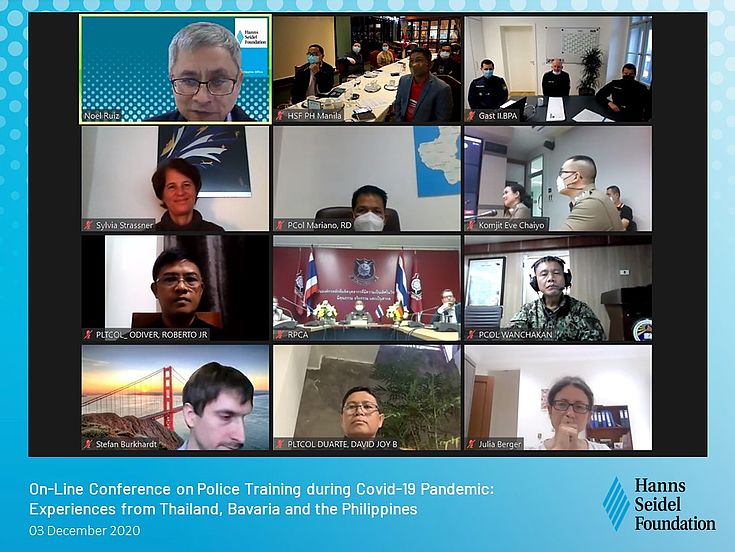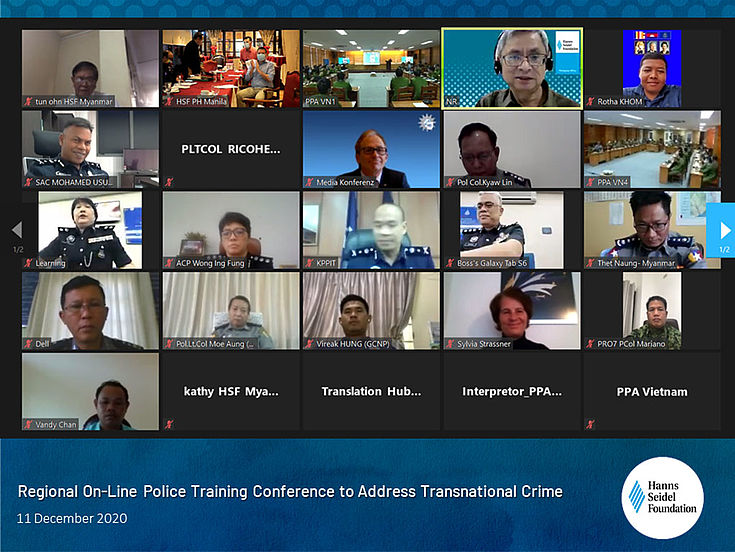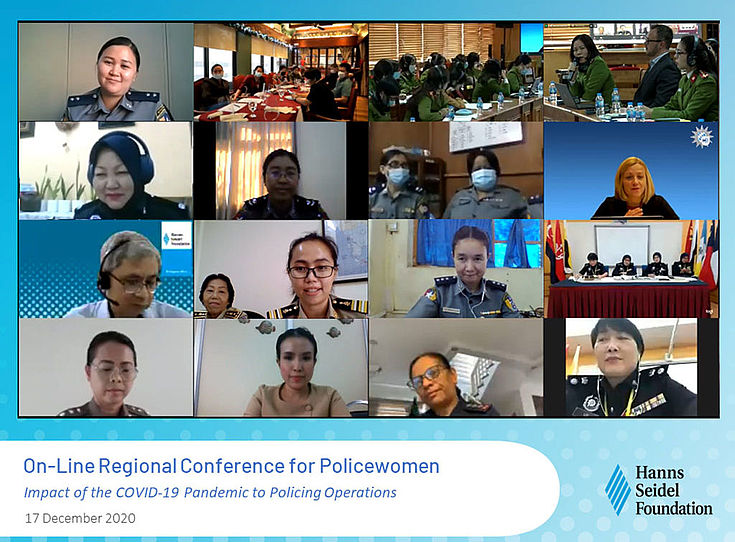Sharing best practices in policing in the region
On-line Conferences in to Discuss Police Training and GAD Issues
Cognizant of quarantine, health and safety protocols brought about by the COVID-19 pandemic, the Hanns Seidel Foundation (HSF) organized three on-line conferences for police officers from the region to maintain professional linkages among participating police officers, share best practices, and experiences to what extent the COVID-19 pandemic affected police training and overall operations. Moreover, the activities demonstrated continuity, and assured participating police agencies of HSF’s commitment to supporting its regional program with the police and planning future activities even with the restrictions on travel and the actual conduct of regional conferences and meetings.
Participants from the Philippine National Police, the Royal Thai Police, and the Bavarian Police Academy
HSF
Regional On-Line Conference on Police Training
The first on-line conference had delegations from the Philippine National Police (PNP) and the Royal Thai Police (RTP) whose members had visited and observed police cadet training at the Bavarian Police Academy (BPA) in Eichstätt, Bavaria. The conference started with a presentation by BPA Director Hubert Müller on how the BPA modified its training program based on established health and safety protocols brought about by the Covid-19 Pandemic. Afterwards, each delegation provided a short overview, of their respective police training activities and challenges due to the Covid-19 Pandemic, still incorporating elements of the training philosophy of the Bavarian Police in local police training and operations, and further adjustments to the conduct of training to maintain the best balance of practical and theoretical instruction. Towards the end of the conference, the participating country delegations acknowledged the positive effects of having their respective police officials participate in information exchange visits to the Bavarian Police Academy to interact with their counterparts and observe the latter's "best practices" in police training. The positive results of this partnership, which started several years ago was affirmed in the conference where the participants stated how the elements of policing of the Bavarian Police, i.e. knowing the legal basis, having practical training, social and communication skills, have been incorporated in the training of PNP and RTP officers. The delegations, on behalf of their respective police agencies, expressed their appreciation to BPA Director Müller and the training officers of the Bavarian Police Academy who managed the program of the police delegations during their visit to the academy and on several occasions visited the Philippines and Thailand to conduct training for local police training officers, and to the Hanns Seidel Foundation for supporting this program with the Bavarian Police.
Participants from the police agencies of Cambodia, Malaysia, Myanmar, Philippines and Vietnam
HSF
Regional On-Line Conference on Transnational Crime
The second on-line conference addressed transnational cyber and cybercrime concerns. Participants from Cambodia, Malaysia, Myanmar, Philippines and Vietnam gave updates on new trends on police training for cyber-crime, the effect of the of the COVID-19 Pandemic for the work of the police and on the crime statistics, and perceived challenges, changes and importance of on-line training. They discussed the passing of legislation which address cybercrime concerns and help law enforcement agencies to investigate cyber- and cybercrime related cases. Also at the conference, Police Senior Chief Superintendent Bernhard Egger of the Central Investigation Services / Cybercrime Division of the Bavarian State Police based in Munich discussed the current trends as these relate to cybercrime and how this and the COVID-19: pandemic affects or challenges the police. The COVID-19 Pandemic has, with its resulting quarantine, health, and safety protocols, affected how the police organization conducts its training. While this severely affect activities which require physical contact, conduct of police training on information technology and cyber- related subjects has benefited from information technologies and development of hardware and software systems and training options available include conduct of “virtual” or internet-based seminars where participants with access to the Internet are able to interact and even share or transfer information on-line. Virtual “training” or conferences and seminars also allow on-line participation of “experts” and resource persons hence negating the COVID-19 restrictions on physical travel. Some participants stated that their organizations modified training to include both on-site (observing physical distancing protocols) and on-line participation.
Participants thanked the conference organizers and recommended that this initiative of promoting cyber- and cybercrime awareness through the conduct of on-line conferences be continued.
Policewomen participants from the national police services of Cambodia, Malaysia, Myanmar, Philippines, Thailand and Vietnam
HSF
Regional On-Line Conference on the Role of Policewomen
The third activity highlights HSF’s interest in promoting positive gender and development (GAD) values and the important role of policewomen in their respective organizations. The conference was attended by policewomen from the national police agencies of Cambodia, Malaysia, Myanmar, Philippines, Thailand and Vietnam police of more than delegates from Indonesia, Malaysia, Myanmar and Thailand. During the conference, Polizeiratin Susanne Kullman of the Bavarian Police gave a presentation on “Women in the Bavarian Police Force. Among the topics in her presentation were the impact of the COVID-19 Pandemic specific to the work of the policewomen and in general to the police organization and crime trends and challenges for the police.
The conference discussed the following points, among others: (a) each participating countries’ police organization, in varying degrees, made progress in promoting gender mainstreaming and balance in the force and there is room for having more policewomen take on senior-level positions; (b) the police force has or can develop programs to highlight the policewomen’s people-management, psychological, emotional, interpersonal, and related skills to respond to domestic-related criminal, and other cases, including community engagement; and (c) the COVID-19 Pandemic response protocols has put additional strain on the police organizations’ manpower, material, financial and other resources and added stress to the police officers stress (e.g. intensive public and inter-agency engagement, longer working hours, risk of infection, time away from family, coping with new digital technologies and social communications) who are given additional duties relating to enforcing health and safety protocols, maintaining public order, and responding to increased numbers of domestic violence (and other related cases) or internet-related crime targeting those citizens mostly “staying-at-home.”
At the end of the conference the participants members expressed their appreciation to the conference organizers supporting activities to promote and bring to the consciousness of police organizations the important role of women police officers, and to have the opportunity amongst themselves to connect with their counterparts in other countries’ police forces, some of which they have fostered professional relationships since attending conferences together in the past.



